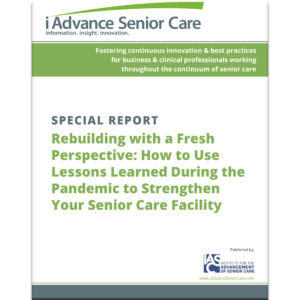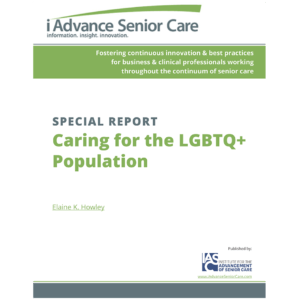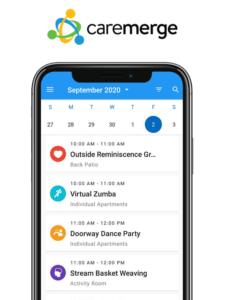The challenges of hiring or housing registered sex offenders
The number of registered sex offenders (RSOs) is increasing as states continue to expand the definition of crimes that require such registration. Furthermore, this population is aging and in need of care in long-term care (LTC) or rehabilitation facilities. Many states have laws concerning admission or management of RSOs in LTC facilities and other states, such as Iowa and South Carolina, are contemplating regulations.
However, many states do not have any specific guidance on admission or discharge of RSOs. For operators with multistate facilities, the laws can differ significantly. This is a difficult issue with legal, ethical, and operational dimensions. However, this issue is not limited to RSOs who are or may become residents.
Facilities also must be mindful of employees, volunteers, and contractors who may have access to residents. They, too, could be registered sex offenders. The industry needs to be prepared to manage the challenges and risks that these individuals may pose to a facility and its residents and staff.
A 2006 report issued by the Government Accountability Office (GAO) to evaluate the prevalence of sex offenders living in LTC facilities found about 700 registered sex offenders living in nursing homes or intermediate care facilities for people with mental retardation. A significant number of registered sex offenders were male and younger than 65 and represented .05 percent of the approximately 1.5 million residents of nursing homes and intermediate care facilities.
Unfortunately, RSOs may also be working in LTC facilities because of inadequate or incomplete background checks or for other reasons. Operators and their attorneys must ensure that the employees providing care to residents do not pose a danger to them by conducting thorough background checks and through vigilant monitoring of employee/resident relations.
The GAO report did not necessarily conclude that RSOs were more likely than other residents to commit sexual crimes. In fact, administrators in the survey expressed more concern about cognitively impaired and individuals with mental health issues committing sex crimes. The report illustrates that facilities need to have robust policies and procedures to also monitor behavioral changes of residents that may demonstrate proclivites to commit sexual crimes.
SEX OFFENDER REGISTRIES
Federal law requires that law enforcement in all 50 states enact sex offender registries and notification laws in order to receive funding for law enforcement initiatives. States are free to determine how registries and notifications are made, which has created significant confusion and in some cases, unclear guidance. As a result of the GAO report, Virginia, in 2007, passed a fairly comprehensive law which requires both assisted living facilities and nursing homes to receive notification of RSOs in the area. In Virginia, LTC facilities are required to register with the state police to receive automatic notification if a sex offender registers or re-registers or if the sex offender's home or work address is in the same or a contiguous zip code of the facility. Facilities in Virginia must determine prior to admission whether potential residents are registered sex offenders if the individual will stay longer than three days or if the person actually does stay longer than three days.
A Massachusetts law prohibits a level 3 sex offender from knowingly and willingly establishing residency in a nursing home or similar facility. There is a potential for jail, as well as monetary fines, this provision is violated. In 2011, a challenge was brought against this law by a 65-year-old Level 3 RSO who was mugged, hospitalized, and sent to a nursing home to recuperate. He then moved to another home where the Boston police told him he could not remain because of his Level 3 status He sued challenging the constitutionality of the law. The court agreed that the statute violated his due process rights because there was no individualized assessment that the public safety risks of him leaving the home outweighed the public safety concerns of him residing in the home.
Supporters of notification legislation argue that these laws provide valuable information to facilities and residents that may not otherwise be readily accessible to them. It would appear that registered sex offender notification laws provide valuable personal safety information to operators, residents, and their families.
Opponents of these laws cite obvious privacy issues and point out that most sex offenders in LTC facilities are not predatory and had convictions decades ago. Thus, those residents are potentially “outed” as sex offenders when they may never pose any real threat to residents or staff. Therefore, in the absence of any real risk, these notification laws could stigmatize the resident and create fear and possibly hysteria when the incidence and risk of harm may be very low.
LTC facilities need to develop or review their policies pertaining to admission, notification, and potential discharge of RSOs in the resident population. As many operators will attest, the best time to prevent RSOs from living in an LTC facility is at admission. Nevertheless, it may be difficult for a facility to outright ban the admission of any RSO because of due process concerns and whether the resident’s deviant behavior is a result of a mental disability.
BACKGROUND CHECKS
There are different methods providers can use to obtain information about a potential resident and whether he or she is a registered sex offender. LTC facilities can conduct background checks of all prospective residents after seeking legal authorization to run these checks from the resident or his or her legal representative.
However, the costs associated with conducting these checks could be significant, create room for error if not done properly, and also take several days or more to complete which is an issue where quick admissions are the norm. A facility may decide to make passage of a successful background check a part of its admissions agreement. If negative information is received, then seek to discharge the resident or void the admissions agreement. However, this can be complicated by regulatory agencies who more often than not will intervene on behalf of the resident and will make such a discharge or transfer difficult or legally risky.
Some facilities in an effort to save money and to better leverage their internal resources may rely on staff members to conduct background checks or searches on prospective residents. These searches may violate the Fair Credit Reporting Act (FCRA) if the facility has not secured authorization from the resident or their legal representative to conduct the search.
Additionally, these registries vary greatly from state to state and how information is organized and various offender levels are defined. Consequently, there is a high potential for mistaken identity and error, which could lead to regulatory action and litigation. Another possibility is to have a question on the admission application inquiring whether the individual is a registered sex offender. While this self disclosure may be the least expensive and intrusive way of obtaining this information, such a query will obviously invite further questions from potential residents and their families on how the facility safeguards against admission of RSOs.
Other LTC facilities that are located in states where disclosure is not required may decide not to inquire about the status of a resident upon admission. Unfortunately, this could be a risky endeavor as other residents or their families could discover on their own that there is an RSO residing in the facility which could lead to concern or bad publicity.
Once the information is obtained, facilities have to take a balanced approach when deciding whether to deny admission to a registered sex offender. While there do not appear to be any laws which strictly prohibit a facility from denying admission to an RSO, facilities need to be careful not to inadvertently violate the law by not admitting someone who may have committed a sex crime based on a mental disability or by failing to administer a policy on a consistent basis. Operators should consider the level of the offense, years since offense was committed, nature of offense, any rehabilitation efforts, and the resident's current medical condition.
On the other hand, some facilities will outright deny admission to any registered sex offender without conducting any type of risk analysis. Providers should discuss these issues with legal counsel to determine whether their policies are legally compliant.
ADMITTING AN RSO
If a facility decides to admit an RSO, any notification required by law must be given. Furthermore, a safety plan to deal with the resident is a good idea. For example, the resident may need more frequent checks by staff than other residents.
More often than not, the first time a facility is made aware that there actually is a registered sex offender in its midst is when a curious family member, resident, employee, or a community member informs the administrator. The facility will first need to validate whether the information is accurate. The facility must then decide after reviewing the state law and its internal policies whether it is going to notify the community at large. As a best practice, any information relating to a resident's status as an RSO should be maintained separate and apart from the resident's medical file to ensure Health Insurance Portability and Accountability Act (HIPAA) compliance.
When an RSO is identified, it is important to get the state department of health or ombudsman involved, particularly if discharge or transfer of the resident is being considered. It should be determined if the individual poses any risk to the community. Operators should think broadly and consider staff and visitors, such as small children, when conducting the risk assessment. The issue should be discussed with in-house and/or outside counsel to determine the most prudent course of action.
In addition to having policies to deal with potential sex offenders in the resident population, LTC providers must also maintain robust policies to guard against sex crimes that could be committed by employees, volunteers, and contractors. Most facilities run background checks on employees, but many do not realize the background checks are incomplete or may not even search sex offender registries.
BACKGROUND CHECKS ON NONEMPLOYEES
Also, facilities should strongly consider conducting background checks of any individual with direct access to residents such as volunteers. Contractors doing work in resident’s rooms should also be checked by the facilities or be assured that the contractor’s employer has conducted a thorough background check on the worker. Many states are moving toward a fingerprint-based model of background check which, although more expensive, is generally found to be more reliable.
Any positive results are going to have to be closely reviewed against any state law prohibitions on employment with certain conditions and, if not, by reviewing the candidate's job duties and position. The legal landscape of criminal background checks is rapidly changing and many states and cities have enacted "ban the box" legislation prohibiting an employer from inquiring about a criminal conviction on an employment application.
SUMMARY
There has been robust discussion in the LTC community about revisiting outright bans on employment based on commission of certain crimes. In December 2012, the Centers for Medicare & Medicaid Services National Background Check Program LTC Convictions Work Group released a report, which concluded that some federal guidance in the area of defining individuals with direct access to residents and reviewing limits for disqualifying convictions may be advisable.
As the laws vary greatly and costs and other administrative issues come into play, it is clear that there is not one solution for the complex issue of RSOs in the resident or employee populations. Nevertheless, it is clear that providers should develop, review, or revise their policies to make certain they are in compliance with all state and federal laws. Operators and their counsel need to develop workable balanced policies that mitigate risk but do not create stigma to residents in need of care.
Caroline J. Berdzik is a partner at Goldberg Segalla LLP and a former assistant general counsel for New Jersey’s largest privately held LTC company. She can be reached at cberdzik@goldbergsegalla.com.
Disclaimer:This article is not legal advice. Consultation with licensed and experienced legal counsel is advised.
Related Articles
Topics: Advocacy , Articles , Executive Leadership , Risk Management , Staffing










